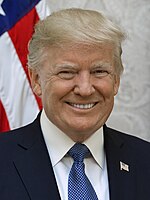| ||||||||||||||||||||||||||
| Reporting | as of Nov. 10, 2024, 2:00 PM EDT | |||||||||||||||||||||||||
|---|---|---|---|---|---|---|---|---|---|---|---|---|---|---|---|---|---|---|---|---|---|---|---|---|---|---|
| ||||||||||||||||||||||||||
 County results
| ||||||||||||||||||||||||||
| ||||||||||||||||||||||||||
| Elections in Ohio |
|---|
 |
The 2024 United States presidential election in Ohio was held on Tuesday, November 5, 2024, as part of the 2024 United States presidential election in which all 50 states plus the District of Columbia participated. Ohio voters chose electors to represent them in the Electoral College via a popular vote. Ohio had 17 electoral votes in the Electoral College, following reapportionment due to the 2020 United States census in which the state lost a seat.[1]
A heavily populated Midwestern state located mainly in the Rust Belt, and the southern portion of the state having cultural influence from the Upper South and Bible Belt, Ohio had been considered a vital bellwether state for decades and had been decided by single digits at the presidential level since 1992, but has been trending towards the political right in recent years and is now considered a moderately red state. The state voted significantly more Republican than the U.S. at large when Donald Trump carried the state by just over eight points in the past two elections, despite polls showing a tight race in both cycles, especially in 2020, in which the state backed the losing presidential candidate for the first time in 60 years. This is the first time since 1988 that the state voted Republican in three consecutive presidential elections and the first time since 2012 that it voted for the winner of the national popular vote.
The GOP's success in Ohio during the 2022 midterms has further testified to the state's rightward shift and the likely end of its bellwether and swing-state distinctions at the presidential level. Ohio was widely expected to be carried again by Trump in the November general election.[2] JD Vance's selection was seen as a strategic effort to bolster support in the Midwest (especially his home state) and among Trump supporters. Independent candidate Robert F. Kennedy Jr. gathered enough signatures to appear on the ballot.[3]
Donald Trump would go on to win Ohio for the third straight election, defeating Kamala Harris by 11.35 percentage points in the biggest margin of victory since 1984.
The election was held concurrently with a U.S. Senate race in Ohio, in which Republican nominee Bernie Moreno unseated Democratic incumbent Sherrod Brown, which was partly credited to Trump's overall success in the state. Additionally, an attempt to establish a redistricting commission (with the goal of ending gerrymandering) was proposed on the state's ballot but was defeated after being denounced by Trump.[4][5] This was also, in part, credited towards Trump's popularity in the state amongst other factors.[6]
- ^ Wang, Hansi; Jin, Connie; Levitt, Zach (April 26, 2021). "Here's How The 1st 2020 Census Results Changed Electoral College, House Seats". NPR. Archived from the original on August 19, 2021. Retrieved August 20, 2021.
- ^ "270toWin - 2024 Presidential Election Interactive Map". 270toWin.com. Retrieved March 29, 2024.
- ^ Pelzer, Jeremy (May 9, 2024). "Robert F. Kennedy Jr.'s campaign says he has enough signatures to make Ohio's 2024 presidential ballot". cleveland. Retrieved May 9, 2024.
- ^ "Ohio voters reject replacing troubled mapmaking system with citizen-led redistricting commission". AP News. November 5, 2024. Retrieved November 10, 2024.
- ^ "Trump Denouncing Special Issue 1".
{{cite web}}: CS1 maint: url-status (link) - ^ Bischoff, Jessie Balmert and Laura A. "Issue 1 fails big in Ohio despite massive money advantage". The Columbus Dispatch. Retrieved November 14, 2024.

